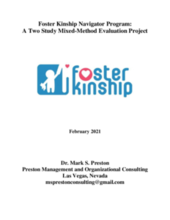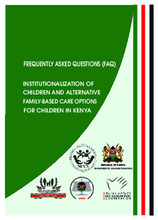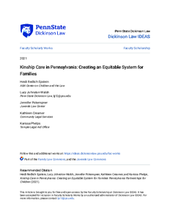Displaying 81 - 90 of 608
This article explores evidence which shows that the use of ‘private family arrangements’ is motivated partly by a concern for subsidiarity, and partly by necessity: they provide a source of placements in cases where regulatory requirements and a lack of resources would otherwise make the placement challenging or impossible.
This qualitative evaluation was to determine the level of fidelity of Clark County Nevada’s Foster Kinship navigator program to its navigator program manual and to ascertain if Foster Kinship’s navigator program for formal kinship families met the minimum standard for promising practice.
This booklet emphasizes the importance of family based care for the care of orphaned and vulnerable children (OVC) in Kenya, provides answers to regularly asked questions, and lists current government efforts to support OVC, including the policy and legal frameworks and existing forms of family and community-based care.
In this How We Care series, Family for Every Child presents the programming of three CSOs on how they are supporting kin carers and the vulnerable children in their care, in their respective regions.
"While Pennsylvania has made great strides in ensuring family preservation, placement with kin and the maintenance of kinship connections, there is an opportunity to identify strategies to increase these outcomes and become a national leader in putting families first," this report argues. The paper outlines concrete policy solutions that "can improve this trajectory, making Pennsylvania a model for other states [in the U.S.]."
In line with recent policy discussions on mechanisms to regulate informal kinship care practices, this study aimed to identify how the State could be involved in improving kinship care experience for children.
This secondary analysis involved exclusively parents with children placed in kinship care by a child welfare agency. It examined associations between parents’ receipt of needed services and 6 sets of variables measuring parents’ needs, access to service providers, social structural factors, demographic factors, family resources, and child welfare interventions experienced.
The Critical On-going Resource Family Education (CORE) Teen is a comprehensive foster parent training program designed to provide resource parents with the knowledge and skills to support teens in their care. This study examined results from trainings conducted across four states and one tribal nation in the U.S.
This study assessed educational opportunities and the support available to orphans and vulnerable children (OVC) in Bagamoyo District to determine socioeconomic and psychological factors that limit access to education.
This article describes results from the second part of an Australian research project that explored the prevalence, experiences and support needs of kinship carers aged 18–30 years through interviews with 41 kinship carers.




